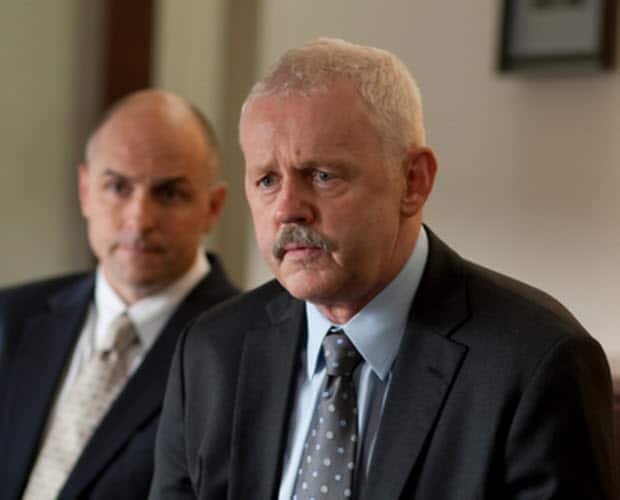
Although there’s a lot of narrative sprinting going on in “Sunset on Louisianne”, there’s still a lot of beautiful little touches that help distract from the sudden culmination of series-long arcs. But even as the curtains begin to close on Treme and its characters, David Simon and company continue to deliver poignant little vignettes about New Orleans and the struggles looming ahead for a city all-too-willing to forget itself.
It’s the little moments in “Sunset and Louisianne”: Antoine’s desperate journey to recapture the magic of being a musician, Toni’s face when she finally hears that the FBI is willing to listen about the corruption infesting the New Orleans police department… the list goes on and on, as many characters finally find the post-storm stagnation lifting off their lives as the series draws to a close, for better or worse (for some, like the jazz center or the FBI’s involvement, it’s not clear which one of these it is).
Without the ability to construct a full-season storyline, Treme isn’t reaching for a stopping point, instead using the final episodes to shape this idea that New Orleans (and its people) are turning a corner. Annie’s finally branching out as a musician, the jazz center plans are coming to fruition, and Davis is turning 40 — like the city they live in, their futures are as uncertain as the name on Janette’s restaurant, culminating the series by leaving us with a blank page to imagine a future for the people we’ve spent the last few years with in the Sixth Ward.
That’s not to say “Sunset in Louisianne” is a docile episode of Treme: the opening scene might be the most overt shot at corporate culture, a scathing little poke at businesses trying to profit off musicians: Davis’s manager seems annoyed by the presence of numerous musicians banging away in the studio, making it hard to get to his office on the other side of the studio, a reminder of how corporations in New Orleans view the music scene. They certainly want to make a ton of money off of it, but only when it doesn’t get in their way, like a noisy nightclub on the corner of a desirable piece of property (Hidalgo’s Blue Note died before it was born), or an after-school program that isn’t an “insurance liability” (like Davis, Antoine’s dreams are crushed by the contradictions of those in power).
It’s really reflective of everything that happens in the episode, right from the opening shot: as the song slowly builds and builds, it speaks to the slow progress the city and it’s inhabitants have made in the wake of Katrina — and also speaks to the inevitability of something in the world trying to tear it down or corrupt it beyond recognition. It ties directly into the final day of Albert’s life: a man who spent years rebuilding something that was stolen from him by a combination of bad luck and broken political systems, literally giving his life to preserve the internal harmony his determined heart found after the death of his wife. There are always cancers in the world threatening what we’ve built — and although we all like to think fighting the “good fight” will lead to victory in the end, it doesn’t, even when we get the exactly what we’ve been waiting for (the general reluctance to trust the US Attorney’s sudden interest in corruption, for example.)
Despite the expediency with which it dispatches stories, “Sunset in Louisianne” is a wonderful penultimate episode of David Simon’s latest criminally-underrated mediation on America. It’s just too bad we don’t get to spend more time with Chief before he passes in the episode’s somber closing moments, or with Del or Davis as they work on their respective music-related endeavors — but hey, at least we got to spend one more night out on the town with ol’ Antoine. If Treme‘s taught me anything, it’s about how we gotta appreciate the small things, even if they ain’t got no swang. – Randy
[Photo via Paul Schiraldi/HBO]
 Follow Us
Follow Us





